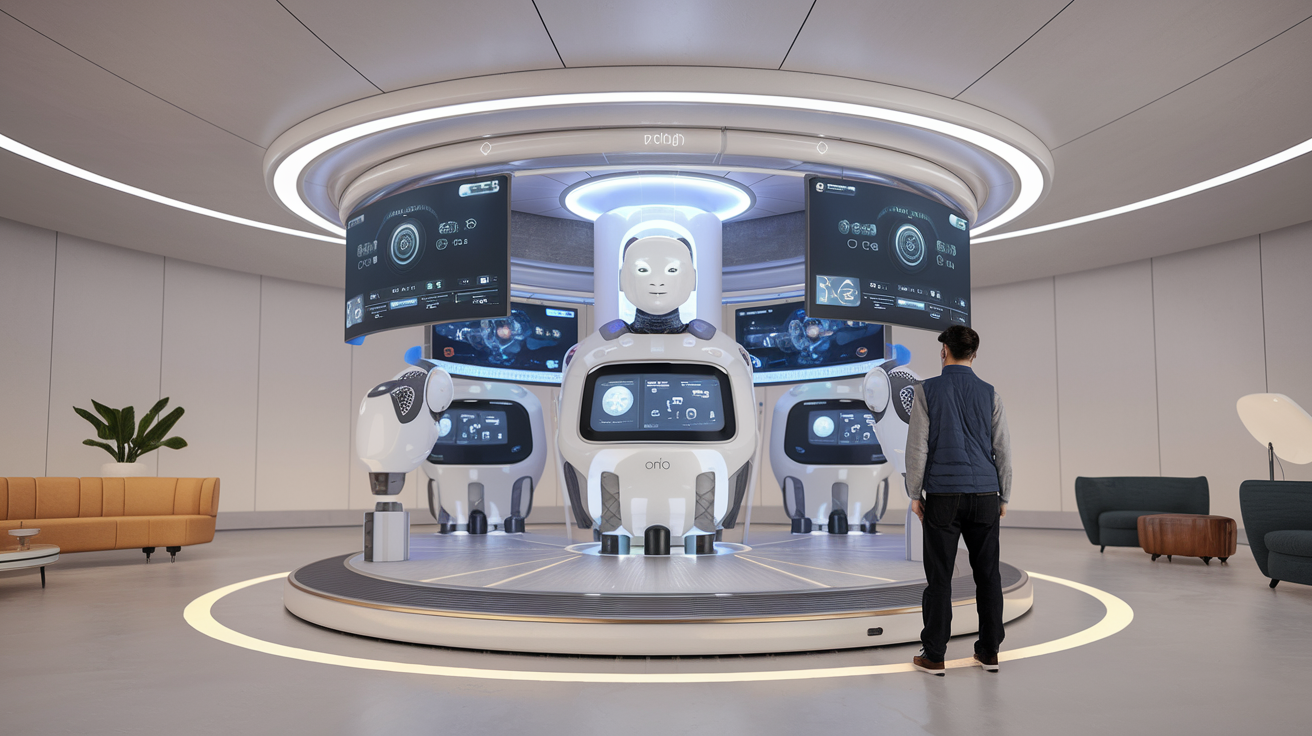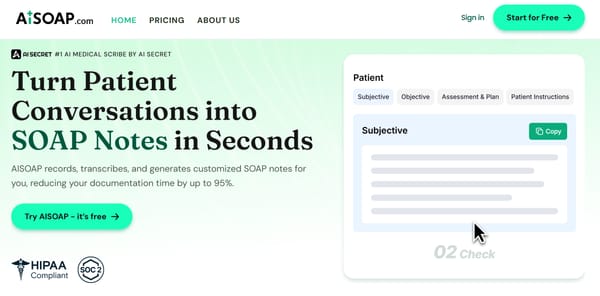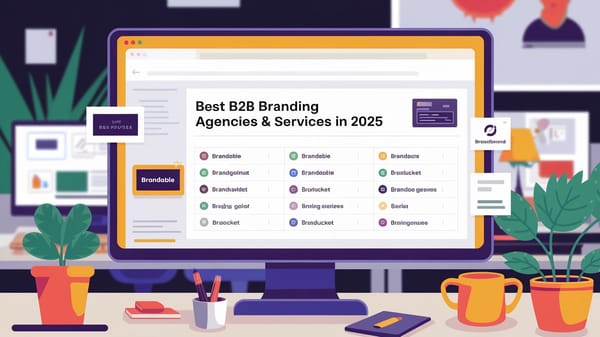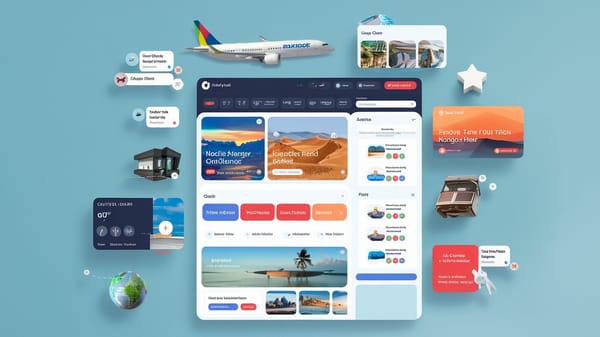AI vs Marketing Agencies: How The Best Are Using AI Today

In the rapidly evolving landscape of digital marketing, artificial intelligence (AI) has emerged as a transformative force, reshaping how marketing agencies operate and strategize. As of 2024, AI is not merely an auxiliary tool but a cornerstone of modern marketing strategies, enabling agencies to deliver more personalized, efficient, and data-driven campaigns. This report delves into the innovative ways leading marketing agencies are leveraging AI to stay ahead in a competitive market.
AI's integration into marketing has allowed agencies to harness vast datasets, providing deeper insights into customer behavior, preferences, and trends. This data-driven approach facilitates the creation of highly customized campaigns that resonate with target audiences, ultimately boosting engagement and sales. For instance, AI-powered analytics and SEO tools are now indispensable for agencies seeking to optimize their digital presence and enhance campaign effectiveness (Influencer Marketing Hub).
Moreover, AI's automation capabilities have revolutionized workflow efficiency, allowing marketing teams to focus on strategic and creative tasks. By automating repetitive processes such as lead outreach and customer service, agencies can allocate more resources to innovation and strategic planning (Digital Agency Network). This shift not only improves operational efficiency but also enhances the overall customer experience through timely and personalized interactions.
The use of AI in marketing is also driving significant advancements in content creation and personalization. AI tools like chatbots and content recommendation engines enable agencies to deliver relevant and engaging content tailored to individual user preferences, fostering brand loyalty and increasing conversion rates (Forbes). As AI technology continues to evolve, its role in marketing is expected to expand, offering even more sophisticated tools for audience engagement and campaign optimization.
However, the journey to successful AI integration is not without challenges. Agencies must navigate issues such as data privacy, algorithmic bias, and the ethical use of AI-generated content. Balancing innovation with caution is crucial to maximizing AI's benefits while mitigating potential risks (Forbes).
In conclusion, AI is reshaping the marketing landscape, offering unprecedented opportunities for agencies to enhance their strategies and connect with audiences on a deeper level. As AI continues to advance, marketing agencies that effectively integrate these technologies with human creativity and strategic insight will be well-positioned to thrive in the future.
You can also visit Oncely.com to find more Top Trending AI Tools. Oncely partners with software developers and companies to present exclusive deals on their products. One unique aspect of Oncely is its “Lifetime Access” feature, where customers can purchase a product once and gain ongoing access to it without any recurring fees. Oncely also provides a 60-day money-back guarantee on most purchases, allowing customers to try out the products and services risk-free.
Oncely are hunting for the most fantastic AI & Software lifetime deals like the ones below or their alternatives:

Table of Contents
- AI Applications in Marketing Agencies
- AI-Driven Content Creation and Personalization
- Predictive Analytics and Consumer Insights
- Automation of Routine Tasks
- AI-Powered Graphics and Image Content
- Real-Time Data Analysis and Reporting
- Challenges and Considerations for AI Integration in Marketing Agencies
- Legacy Systems Compatibility
- Data Integration and Quality Challenges
- Technical Compatibility and System Integration
- Staffing and Training
- Ethical and Regulatory Considerations
- Future Trends in AI-Driven Marketing
- AI-Driven Personalization and Customer Engagement
- Predictive Analytics and Consumer Behavior Insights
- Automation of Routine Marketing Tasks
- AI-Enhanced Augmented Reality Experiences
- Ethical Considerations and Workforce Implications
AI Applications in Marketing Agencies
AI-Driven Content Creation and Personalization
Marketing agencies are increasingly leveraging AI to enhance content creation and personalization. AI tools such as Jasper.ai and Copy.ai are being utilized to generate creative content ideas, automate content production, and ensure that the content is tailored to specific audience segments. These tools use natural language processing (NLP) and machine learning algorithms to analyze vast amounts of data, enabling marketers to create content that resonates with their target audience. This approach not only saves time but also enhances the relevance and engagement of marketing campaigns.
AI's ability to personalize content extends to real-time optimization, where algorithms adjust marketing messages based on user interactions and preferences. This dynamic personalization is crucial for improving customer engagement and conversion rates. According to a DigitalOcean report, 73% of U.S. marketers have integrated generative AI tools like chatbots into their operations, highlighting the widespread adoption of AI for personalized marketing.
Predictive Analytics and Consumer Insights
Predictive analytics is another significant application of AI in marketing agencies. By analyzing historical data and identifying patterns, AI can forecast future consumer behaviors and trends. This capability allows agencies to anticipate customer needs and tailor their strategies accordingly. For instance, AI-driven platforms can predict which products a customer is likely to purchase next, enabling marketers to create targeted promotions and offers.
AI tools such as NeuralMind are designed to predict consumer actions and drive conversions by analyzing datasets like first-party data and user journey information. This predictive capability is crucial for optimizing marketing strategies and improving return on investment (ROI). A HubSpot survey found that 44% of respondents reported a positive ROI from their AI and automation investments, underscoring the financial benefits of predictive analytics.
Automation of Routine Tasks
AI's automation capabilities are transforming the way marketing agencies operate by streamlining routine tasks and freeing up resources for more strategic activities. AI-powered tools can automate lead outreach, ad buying, and customer segmentation, significantly reducing the workload for marketing teams. This automation not only enhances efficiency but also allows agencies to focus on creative and strategic aspects of their campaigns.
For example, AI chatbots are increasingly used for customer service and engagement, providing instant responses to customer inquiries and gathering valuable data for further analysis. According to Influencer Marketing Hub, 61.4% of marketers are actively using AI to optimize lead generation channels and scale campaigns, demonstrating the widespread adoption of AI for automation purposes.
AI-Powered Graphics and Image Content
The creation of unique and inimitable graphics is another area where AI is making a significant impact. AI-powered graphic design tools enable agencies to produce fresh and original visual content that stands out from stock images. This capability is particularly important in a digital landscape where visual content plays a crucial role in capturing audience attention.
Agencies are using AI to generate graphics that are tailored to specific brand aesthetics and campaign themes. As noted by Forbes Agency Council, the use of AI in graphic design is still in its early stages, but it holds great potential for creating visually compelling content that enhances brand identity and engagement.
Real-Time Data Analysis and Reporting
AI tools are revolutionizing data analysis and reporting by providing real-time insights and actionable recommendations. Platforms like AgencyAnalytics offer AI-driven reporting tools that automate data analysis, uncover hidden insights, and deliver personalized narratives. These tools enable agencies to make informed decisions quickly and present data-driven recommendations to clients.
Real-time data analysis is essential for monitoring campaign performance and making necessary adjustments to optimize results. AI's ability to process large volumes of data in real time allows marketers to identify trends and opportunities that drive strategic growth. This capability is particularly valuable in a fast-paced digital environment where timely decision-making is critical for success.
In summary, AI applications in marketing agencies are diverse and transformative, enhancing content creation, personalization, predictive analytics, automation, graphic design, and data analysis. By leveraging AI, agencies can improve efficiency, engagement, and ROI, positioning themselves at the forefront of the digital marketing landscape.
Challenges and Considerations for AI Integration in Marketing Agencies
Legacy Systems Compatibility
One of the primary challenges marketing agencies face when integrating AI is the compatibility with legacy systems. These systems, often built on outdated architectures, lack the flexibility to support modern AI applications. For instance, a legacy Customer Relationship Management (CRM) system may not support the necessary APIs or data formats required for AI-driven analytics tools, leading to significant integration difficulties (Dapta AI). This issue necessitates a comprehensive assessment of existing systems to identify potential compatibility gaps and the development of middleware solutions to bridge these gaps.
Data Integration and Quality Challenges
Data integration and quality are critical to the success of AI in marketing. Agencies must manage diverse data sources, including structured databases and unstructured data from social media and IoT devices. The variety of data formats and structures poses significant challenges in ensuring data accuracy and compatibility (Dapta AI). Effective data management strategies, real-time data processing, and robust data governance frameworks are essential to overcome these obstacles. Utilizing advanced data integration tools and platforms can help agencies manage this complexity and ensure a seamless data integration process.
Technical Compatibility and System Integration
Ensuring technical compatibility between existing systems and AI applications is a common challenge. Marketing agencies often have established software and systems, and integrating AI into these frameworks can be complex and time-consuming (Mags Marketing). This process requires careful planning, coordination, and collaboration between IT teams and AI implementation experts. By assessing the compatibility of AI systems with current infrastructure, agencies can identify potential conflicts and develop solutions to integrate AI seamlessly into their digital marketing ecosystem.
Staffing and Training
The integration of AI into marketing strategies also presents challenges related to staffing and training. There is often a lack of skilled personnel who are proficient in both marketing and AI technologies. This skills gap can hinder the effective implementation and utilization of AI tools within agencies (Mags Marketing). To address this, agencies need to invest in training programs that equip their staff with the necessary skills to leverage AI technologies effectively. Additionally, hiring AI specialists or collaborating with external AI experts can provide the expertise needed to navigate the complexities of AI integration.
Ethical and Regulatory Considerations
As AI continues to evolve, marketing agencies must navigate ethical and regulatory considerations surrounding digital privacy and AI usage. The ability of AI to analyze large volumes of data in real-time raises concerns about data privacy and the ethical use of consumer information (Phable). Agencies must stay abreast of evolving regulations and ensure compliance with data protection laws. This involves implementing robust data privacy measures and developing transparent AI practices that maintain consumer trust and authenticity in brand messaging.
In summary, while AI offers significant opportunities for marketing agencies to enhance their operations and deliver personalized experiences, the integration process is fraught with challenges. Addressing issues related to legacy systems, data integration, technical compatibility, staffing, and ethical considerations is crucial for agencies to fully realize the potential of AI in their marketing strategies. By adopting a strategic approach and leveraging the right tools and expertise, agencies can overcome these challenges and harness the transformative power of AI.
Future Trends in AI-Driven Marketing
AI-Driven Personalization and Customer Engagement
AI-driven personalization is set to revolutionize marketing by offering hyper-personalized experiences to consumers. This trend involves using AI to analyze vast amounts of data from multiple touchpoints to create individualized marketing messages and offers in real-time. Companies like Dynamic Yield and Persado are at the forefront of this innovation, pushing the boundaries of personalized marketing. The ability to deliver contextually relevant content enhances customer engagement and conversion rates, making AI an indispensable tool for marketers.
AI's role in customer engagement extends beyond personalization. It includes creating interactive experiences on social media platforms through AI-driven chatbots and personalized recommendations. This approach not only makes social media marketing more dynamic but also more effective, as highlighted by MarketSense. The integration of AI in these areas is expected to continue growing, offering marketers unprecedented insights into consumer behavior and preferences.
Predictive Analytics and Consumer Behavior Insights
Predictive analytics powered by AI is transforming how marketers understand and interact with their audience. By leveraging deep learning algorithms, AI can predict customer needs, preferences, and future behaviors with unprecedented accuracy. This capability enables marketers to develop hyper-targeted strategies and personalized customer experiences, as noted by ContentGrip.
The ability to predict consumer behavior is set to become even more sophisticated, offering marketers insights into what customers want and how they want it. This trend is supported by advancements in AI technologies, which allow for more accurate predictions and better decision-making processes. As AI continues to evolve, its role in predicting consumer behavior will become increasingly critical for marketers looking to stay ahead of the competition.
Automation of Routine Marketing Tasks
AI is increasingly being used to automate routine marketing tasks, freeing up human resources for more strategic activities. By 2025, it is predicted that AI chatbots will manage up to 85% of customer interactions without human intervention, significantly enhancing efficiency and customer service (ContentGrip). This automation trend is not limited to customer interactions; it extends to various marketing tasks such as content creation, data analysis, and campaign management.
The automation of routine tasks allows marketing agencies to operate more efficiently and effectively. It reduces the time and effort required for repetitive tasks, enabling marketers to focus on more creative and strategic initiatives. This shift is expected to continue as AI technologies become more advanced and capable of handling complex marketing tasks.
AI-Enhanced Augmented Reality Experiences
The integration of AI with augmented reality (AR) is an emerging trend that is set to impact marketing significantly. AI-enhanced AR experiences provide customers with interactive and immersive ways to engage with products and brands. This trend is driven by advancements in AI technologies that enable more sophisticated and engaging AR experiences (ContentGrip).
AI-enhanced AR experiences offer marketers new opportunities to connect with their audience in meaningful ways. By providing immersive and interactive experiences, marketers can create stronger emotional connections with consumers, leading to increased brand loyalty and engagement. As AI and AR technologies continue to evolve, their integration is expected to play a crucial role in shaping the future of marketing.
Ethical Considerations and Workforce Implications
As AI becomes more integral to marketing, ethical considerations and workforce implications are becoming increasingly important. The use of AI in marketing raises questions about privacy, data security, and the ethical use of consumer data. Marketers must navigate these challenges to ensure that AI is used responsibly and ethically (ContentGrip).
In addition to ethical considerations, the integration of AI in marketing has significant implications for the workforce. As AI automates routine tasks, there is a growing need for marketers to develop new skills and expertise in AI technologies. This shift requires investment in training and development to ensure that marketers can effectively leverage AI to enhance their strategies and campaigns.
Overall, the future of AI-driven marketing is set to be dynamic, data-driven, and more personalized than ever before. As AI technologies continue to evolve, they will play an increasingly pivotal role in shaping the marketing landscape, offering marketers new opportunities to connect with their audience and drive business growth.
References
- https://digitalagencynetwork.com/top-ai-marketing-agencies-and-campaigns/
- https://www.leadsie.com/blog/best-ai-tools-for-marketing-agencies
- https://www.mckinsey.com/~/media/mckinsey/business+functions/marketing+and+sales/our+insights/ai+powered+marketing+and+sales+reach+new+heights+with+generative+ai/ai-powered-marketing-and-sales-reach-new-heights-with-generative-ai.pdf
- https://jake-jorgovan.com/blog/top-ai-marketing-agencies
- https://influencermarketinghub.com/ai-marketing-agencies/
- https://digiquation.io/articles/ai/ai-digital-marketing-strategies-2024/
- https://marketsense.com/blog/5-ai-marketing-strategies-for-2024/
- https://www.thedrum.com/news/2023/07/06/here-s-how-five-major-ad-agencies-are-currently-using-ai
- https://www.forbes.com/councils/forbesagencycouncil/2023/01/03/13-intriguing-ways-agencies-will-be-leveraging-ai-in-2023-and-beyond/
- https://www.contentgrip.com/future-ai-marketing/
- https://www.singlegrain.com/blog/ai-marketing-agency/
- https://www.smartinsights.com/digital-marketing-strategy/trends-in-using-ai-for-marketing-2023-2024/
- https://www.forbes.com/councils/forbesagencycouncil/2023/04/11/15-ways-agencies-are-using-ai-to-streamline-workflows/
- https://owdt.com/article/the-future-of-marketing-in-the-era-of-ai-2024-outlook/
- https://www.marketingaiinstitute.com/blog/2023-state-of-marketing-ai-report





